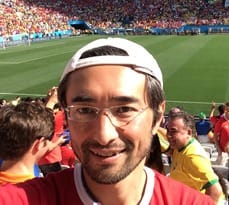The final ball may have been played in Brazil, but for one Cambridge Judge alumnus the inspiration, personally and professionally, will last a long time.

Yasuhide Okabe, MBA 2004, is based in Lucerne, Switzerland, where he is Head of Asia sales at TEAM Marketing AG, the exclusive marketing agency of UEFA, selling media and sponsorship rights to the UEFA Champions League and UEFA Europe League.
Recently back from Brazil, Yasuhide took time out to talk about his role and his experience of the 2014 World Cup.
How did you get into the football business?
I used to play football in one of the strongest university football teams in Japan. In Japan, unlike Europe, more than 50 per cent of the professional football players come out of university football teams. I wanted to become a professional player, but I couldn’t make it, unfortunately! Then, when I watched World Cup 2002 in Japan, I decided (it was a sudden illumination) that this was something I really wanted to do – work in the football industry as one of the people behind the scenes at an event like this.
I decided to go to Europe, the Mecca of the football business, and as a first step, chose to do an MBA in Cambridge. I thought the Cambridge MBA would be the best foundation for finding a fantastic job in the European football industry. During my time at Cambridge Judge I visited all the major clubs, leagues, associations and companies and also got a job at Everton Football Club.
After my experience at Everton, I knew I wanted to be involved in the bigger business of football – e.g. UEFA and FIFA. I targeted TEAM Marketing, one of the most renowned companies in the European football community as the sports marketing company which created the UEFA Champions League with UEFA. Towards the end of my MBA, I called them and made an Elevator Pitch (selling yourself in a minute) to an HR manager on the phone. Lucky me – that short phone conversation changed everything. I was invited to a series of interviews in the UK and Switzerland, landed the job here in Lucerne and became the first and only Asian in the world of UEFA at the time.
What excites you about your job?
I’m a big fan of football. Even though I couldn’t have a career as a professional player, I can still be involved in football – and not just any football, but the UEFA Champions League, which is the best of the best. Also, I travel around the world and meet and work with senior executives in the growing media, football and sports sector. And on top of that – I can see all the big matches as part of my role. For me, this is the dream job!
What are your insights on the World Cup 2014?
I think this was a very special World Cup in many ways. I have been at every World Cup since 1994 in the US, but to have it in Brazil was something extraordinary. Brazilian fans are something special in the world of football and people in Brazil are thought to be one of the happiest people in Latin America – I think that’s why it made the event a very special one.
Also, it was quite interesting to see how all the problems have been forgotten during this period. As you know, a lot of Brazilians are not happy about their government’s expenditure for the World Cup and are also concerned about the high crime rate. But I didn’t see and feel any of that when I was there. It’s amazing how people put all that aside when the football starts.
What was the atmosphere like in Brazil?
Everybody there was really excited. When I was there, the whole nation was embracing the World Cup. Fantastic atmosphere – better than any other World Cups I went to before. However, I think that changed a bit after Brazil’s shocking loss last week.
Was this trip part of your job?
No, I went there for a holiday. It’s quite a different feeling: when I go for my job, we sit in exclusive areas for executives, but this time I was sitting with all the fans and I could really feel the excitement.
Why are such events important to the host country?
It’s a really good economy boost for the host country, despite the fact that governments need to invest a lot in infrastructure and all of the preparations. One of the negative aspects is the financial implication. The requirement to build the entire infrastructure for such big events is enormous. And the event lasts only three weeks. How do you manage all those new stadiums afterwards? Managing multiple stadiums will cost tens of millions every year, so you need to have a well thought-out plan right from the start.
Another good thing is that a lot of people visit the country. This really facilitates international exchange, which is important for countries that may not have a very high international profile. The hype of the big events helps raise the spirits of the citizens and has a positive impact on the nation as a whole.

